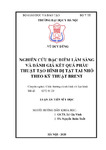
Vui lòng dùng định danh này để trích dẫn hoặc liên kết đến tài liệu này:
http://dulieuso.hmu.edu.vn/handle/hmu/2008| Nhan đề: | Nghiên cứu đặc điểm lâm sàng và đánh giá kết quả phẫu thuật tạo hình dị tật tai nhỏ theo kỹ thuật Brent |
| Tác giả: | Vũ Duy, Dũng |
| Người hướng dẫn: | GS.TS. Lê Gia, Vinh TS. Nguyễn Roãn, Tuất |
| Từ khoá: | 62720129;Chấn thương chỉnh hình và tạo hình |
| Tóm tắt: | Những kết luận mới của luận án:. Phương diện học thuật: đóng góp một nghiên mô tả các đặc điểm dị tật tai nhỏ, ứng dụng kỹ thuật tạo hình bằng sụn sườn tự thân ở trẻ em Việt, bổ sung nguồn tài liệu tham khảo, xác định một số yếu tố ảnh hưởng đến kết quả phẫu thuật. Phương diện thực tiễn: + Bổ sung cho các nhà nghiên cứu, các nhà lâm sàng thêm góc độ nhận diện tính đầy đủ, toàn diện hơn về cách thức tiếp cận, điều chỉnh, áp dụng một số cải tiến so với kỹ thuật Brent trong tạo hình tai.. Một vài thay đổi trong kỹ thuật: Sụn dự trữ “chêm” vùi dưới khung sụn (làm tăng độ nhô tai ở thì 1), trong khi đó Brent thường đặt lại dưới da nơi lấy sụn sườn. Lấy ít sụn hơn (thường lấy 3 sụn 6,7,8), để lại màng sụn khâu thành tùi và vùi sụn thừa, mẩu nhỏ nên hạn chế xuất hiện tình trạng lõm ngực sau mổ. Nhận thức đầy đủ, rõ ràng thực tế khó khăn, kết quả phẫu thuật lâu dài, kỳ vọng của bệnh nhân… Từ đó đề xuất các giải pháp làm cơ sở cho các nhà nghiên cứu hoạch định, nâng cao chất lượng, tính thẩm mỹ của phẫu thuật trong tương lai.. New conclusions of the thesis:Academic aspect: Contribute to a technical application and evaluate the outcome of ear reconstruction by using autogenous rib cartilage grafts, supplement the reference source, identify a number of factors affecting the surgical outcome. Practical aspects: + Supplementing researchers and clinicians with more comprehensive perspective and how to approach, adjust and apply some improvements compared to Brent technology in ear shaping.. A few technical changes: The “wedge” storage cartilage is buried under the cartilage frame (increasing of protrution), while Brent usually restores under the skin where the rib cartilage is taken. Get fewer cartilage (usually take 3 cartilage 6,7,8), leaving perichondrium then sutured into pulp and bury excess cartilage, small pieces should limit the appearance of chest concave postoperation. Fully aware of the difficult realities, long-term surgical results, patients' expectations ... From there, propose solutions as a basis for researchers to plan, improve quality, and assess the competence of patients. beautician's future surgery.. |
| Định danh: | http://dulieuso.hmu.edu.vn//handle/hmu/2008 |
| Bộ sưu tập: | Luận án (nghiên cứu sinh) |
Các tập tin trong tài liệu này:
| Tập tin | Mô tả | Kích thước | Định dạng | |
|---|---|---|---|---|
| 520_TVLA VUDUYDUNG.pdf Tập tin giới hạn truy cập | 4.57 MB | Adobe PDF |  Đăng nhập để xem toàn văn | |
| 520_TTLA VuDuyDung.rar Tập tin giới hạn truy cập | 1.42 MB | WinRAR Compressed Archive |
Khi sử dụng các tài liệu trong Thư viện số phải tuân thủ Luật bản quyền.